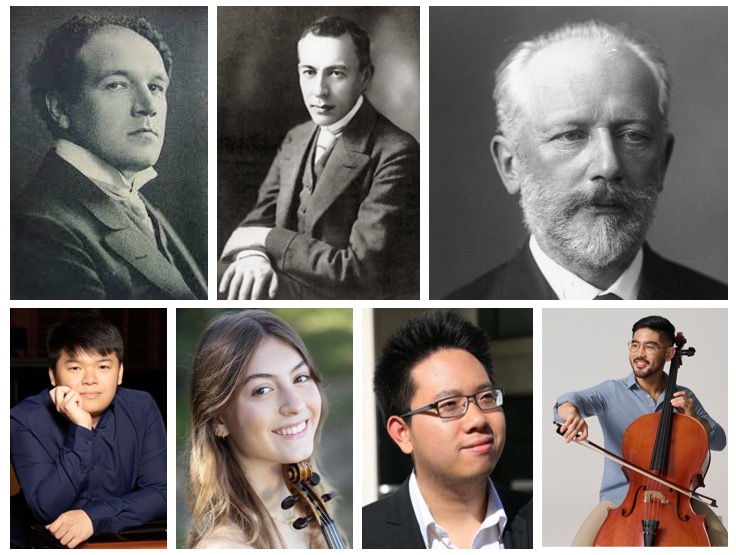Rachmaninov's 150th Anniversary Chamber Music Concert - 'In Memory of Great Artists'
Event description
Rachmaninov's 150th Anniversary Chamber Music Concert - 'In Memory of Great Artists'

Date/Time: 3rd December 2023, 3-5pm
Venue: Pitt Street Uniting Church (264 Pitt St, Sydney, NSW 2000)
Admission: $30 Adult, $20 Student/concession, $10 child (under 12)
Be immersed by elegiac and passionate works of chamber music by great Russian composers: Pyotr Ilych Tchaikovsky, Sergei Rachmaninoff and Nikolai Medtner. Please join us in this end of year concert as we conclude the 2nd part of the “Rachmaninoff-150” series - an acknowledgment and tribute to the composer's legacy in the development of pianistic and musical idioms, along with his most influential contemporaries.
This program includes some of the finest chamber music revolving around the piano - from the early works of the younger composer, Nikolai Medtner's 3 Nocturnes for violin and piano (after Goethe's Nachtgesang) to Rachmaninoff's nostalgic cello sonata, concluding with Tchaikovsky's monumental piano trio in A minor. The deep musical connections between Medtner, Rachmaninoff, Tchaikovsky laid across generations, reflecting the Russian lineage where the senior composers would praise, support and promote the music of the young.
Eminent pianists Ching Pong (Dono) Ng and Alexander Yau will be joined by aspiring young talents: violinist Beatrice Colombis and cellist Noah Oshiro.
PROGRAMME
Nikolai Medtner
Three Nocturnes for violin and piano Op. 16
I. Andante con moto, sempre leggiero
II. Largamente
III. Moderato
Beatrice Colombis, violin
Dono Ching Pong Ng, piano
Sergei Rachmaninov
Sonata for cello and piano in G minor Op. 19
I. Lento – Allegro moderato
II. Allegro scherzando
III. Andante
IV. Allegro mosso
Noah Oshiro, cello
Alexander Yau, piano
--- Interval ---
Peter Ilych Tchaikovsky
Piano Trio in A minor Op. 50
I. Pezzo elegiaco
II. Tema con variazioni: Andante con moto
Beatrice Colombis, violin
Noah Oshiro, cello
Dono Ching Pong Ng, piano
About the program
Medtner and Rachmaninoff
Rachmaninoff was not only a close friend, mentor and a source of inspiration to Nikolai Medtner - he provided much help to his younger contemporary throughout his life, by means of financial support and concertizing his piano music. Their musical connection was intricate and lasting - Medtner gave suggestions during the creative process of Rachmaninoff's 1st piano sonata in D minor in 1908. A few years later, Medtner dedicated his crowning work “Night Wind” sonata, op. 25 no. 2 to Rachmaninoff. A gesture of friendship and mutual admiration, Rachmaninoff’s 4th piano concerto and Medtner’s 2nd concerto were dedicated to each other.
Medtner's 3 Nocturnes Op. 16, based on Goethe’s Nachtgesang, were originally set as art songs, as the young composer did in the 2 sets of Goethe Poems, op. 9 and op. 15. He eventually transformed the 3 pieces into “songs without words” for violin and piano. Nikolai’s brother, Alexander Medtner, was the dedicatee of the set, who was a violinist himself. A dream-like atmosphere is retained throughout the nocturnes as the music closely follows Goethe's poem. First of the many violin-piano duos Medtner composed, the Nocturnes are skilfully polished rare gems.
Admiring Tchaikovsky
As the great artist and role model of many Russian composers in the late 19th Century, Tchaikovsky sung praises to the young Rachmaninoff, even promising to conduct his symphonic works on a concert tour. Although Tchaikovsky's untimely death made this impossible, his influence on Rachmaninoff was overwhelming, most notably in his luscious, endlessly unwinding melodies as well as the reference to the ”Tchaikovsky” theme.
(pEter tCHAikovsky (E-C-B-A)(H=B), as transposed in the famous opening of his 1st piano concerto: F-Db-C-Bb.)
As a gesture of admiration, Rachmaninoff employs the retrogradation of this theme in his own 1st piano concerto in F# minor (F#-G#-A-C#) as well as the 1st piano trio (Trio-élégiaque in G minor; G-A-Bb-D). Keen observations would reveal that the opening of Rachmaninoff’s cello sonata has a similar but slightly modified melodic shape (G–B-C-Eb).
Similarly to his 2nd piano concerto, a product of successful therapy of depression after the failure of his first symphony, the cello sonata has the same ad astra per aspera element, going through minor-major transformation (the 4 movements are in G minor - C minor - Eb major - G major). This powerful work could very well be a celebration, a renewal of hope and joy as Rachmaninoff found his own path. (Notable that the ”Tchaikovsky” theme was not often referenced after the cello sonata.) The work was premiered by the composer at the piano with his close friend, cellist Anatoliy Brandukov - an influential figure who premiered works such as Tchaikovsky’s Pezzo capriccioso, as well as being the teacher of Piatigorsky.
”In Memory of Great Artists”
Completely devastated by the great pianist Nikolai Rubinstein's death, Tchaikovsky spoke, screamed and mourned through this piano trio - a monumental work of the genre, one of the greatest works of all chamber music. This trio, subtitled ”in memory of a great artist”, contains an elaborate first movement, followed by an elegiac theme and variations full of different moods, characters and dances (as if Tchaikovsky was reliving his memories with the passed) which ultimately breaks out into a fiery outcry of the first movement theme that subsides into a tragic solemn end. The work encapsulated feelings of grief, agony and yearning after a heartbreak, the wistful yet sincere wish to move on - all attributes of this timeless masterpiece that captivates countless performers and audience.
After Tchaikovsky’s death in 1893, which shocked the music world, Rachmaninoff began composing his 2nd Trio-élégiaque, ”in memory of Tchaikovsky”. It was no coincidence that Rachmaninoff paid tribute in the same fashion in musical form and style as Tchaikovsky did.
Check out the past performances in our “Rachmaninoff-150” series:
Tickets for good, not greed Humanitix dedicates 100% of profits from booking fees to charity
